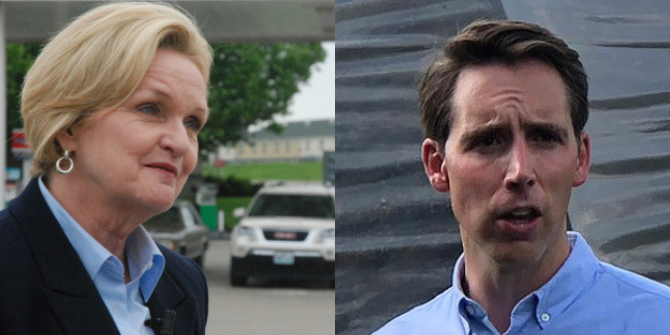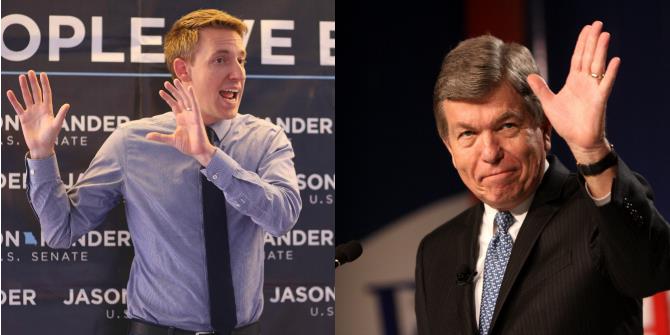 The US Senate race in Missouri between incumbent Democrat Claire McCaskill and Republican state Attorney General Josh Hawley is one of only a small number of toss-up races in the 2018 midterms. Robynn Kuhlmann writes that while McCaskill has had to walk a political tightrope by embracing more moderate positions to appeal to a wider base of voters, Hawley has focused on energizing the state’s conservative base by accusing his opponent of being too liberal for the Show Me State.
The US Senate race in Missouri between incumbent Democrat Claire McCaskill and Republican state Attorney General Josh Hawley is one of only a small number of toss-up races in the 2018 midterms. Robynn Kuhlmann writes that while McCaskill has had to walk a political tightrope by embracing more moderate positions to appeal to a wider base of voters, Hawley has focused on energizing the state’s conservative base by accusing his opponent of being too liberal for the Show Me State.
- This article is part of our blog series covering key 2018 US Senate races. Read the rest of our coverage. The series is published in tandem with the LSE US Centre’s public event, Making Sense of the Midterms on 7 November 2018.
Missouri’s US Senate race between Democratic incumbent Senator Claire McCaskill and Republican Attorney General Josh Hawley is deadlocked in a true toss-up. It is one of 5 toss-up races in which Democrats stand to shift the balance of power in the US Senate. Statewide races in Missouri can be incredibly tricky. Much of the state is comprised of rural conservative strongholds surrounding more liberal urban areas with the suburbs connecting the two with their mixture of Republicans and Democrats. Approximately 41 percent of Missourians identify or lean Democrat, while 45 percent identify or lean Republican. This leaves the impression that there is healthy gap of self-described independents. However, true (or pure) independent voters are a myth and tend to lean one way or another on the partisan scale.
In this election, McCaskill is making up for Democratic deficiencies in the state through enthusiasm, short-term national forces, and poising herself as a moderate. Hawley, on the other hand, is engaging in partisan warfare, painting Claire McCaskill as a liberal wolf in moderate-sheep’s clothing. He is tapping into significant issues that align more adroitly with conservative voters. In Missouri, the political fault line leading to the US Senate is thin. This means that both Hawley and McCaskill have to energize their base and lure the less enthusiastic out to vote.
In Missouri, some races are insulated from purely partisan forces
In 2016, Josh Hawley campaigned as a political outsider promising to shake up the “Jefferson City cartel.” He handedly won Attorney General’s seat with a 17 point vote margin. While Donald Trump came out of the Presidential election with a 19 point advantage, other races illustrated that Missourians were in the mood for political outsiders. Outsider and political neophyte, Eric Greitens, for example, beat well-like Republican turned Democrat Chris Koster for the Governor’s seat. Meanwhile, incumbent Republican Senator Roy Blunt had a close call with Democrat Jason Kander. Also running as a political outsider as a Democrat in Trump country, Kander lost by only 2.9 percentage points. This exemplifies the ‘trickiness’ of Missouri’s statewide races. Indeed, some races in Missouri are insulated from purely partisan forces.
Josh Hawley, deemed the ‘Golden Boy’ of Missouri’s republican leadership was publically urged to run in the 2018 US Senate race. Reluctant to enter, his first few strides were rough. Out of the gate, he was dealing with a scandal-plagued Governor’s office who still had support of a slim majority of republicans. An easy target, he was criticized by McCaskill’s campaign for being soft on the governor – contradicting his ‘law and order’ campaign. From the beginning, Hawley was taking shots from both sides of the partisan aisle. Adding salt to his wounds, prominent Republicans publically lamented a sort of ‘buyers remorse.’ Enthusiasm for his candidacy was not what they expected. The challenge for Hawley, was jockeying enough excitement for his campaign – while the Governor’s problems clouded his ability to make a clear target of Claire McCaskill. His tether was cut once Governor Greitens resigned. Hawley then turned up the heat on a tough and seasoned competitor.
Claire McCaskill is a tough political opponent. She has a history of being an astute and talented political adversary. Her experience spans twenty years of service in state-wide positions. In 2004 when she was State Auditor, she ran in the gubernatorial primary and beat incumbent Democrat governor, Bob Holden. She lost the general election, but ran a competitive campaign. Despite defeat, McCaskill kept a steady gaze up the political ladder. No stranger to competition, she won her bid for US Senate in 2006.

Credits: Sen. Claire McCaskill discusses pain at the pump by KOMUnews is licensed under CC BY 2.0; Josh Hawley By Natureofthought [CC BY-SA 4.0], from Wikimedia Commons
Her last US Senate race illustrated talent in carefully crafting campaigns. 2012 ended up being an easy win. Right wing conservative candidate Todd Akin drew national outrage he stated that women rarely get pregnant if it was a ‘legitimate rape.’ This effectively gutted his race and landed McCaskill another six years in the US Senate. McCaskill later revealed that she targeted Akin in the republican primary so that she could beat him in the general election.
McCaskill is walking a political tightrope while Hawley deploys partisan warfare
McCaskill does not face an easy win this time around. Touting her voting records, she paints herself as a true moderate reflective of Missouri’s values. She often points out that she aligns with President Trump on some issues. Although politically attractive to many Missourians, she has risked losing her base that lay further to the left on the political spectrum. However, the left has nowhere else to go if they want a Democrat in office. National controversies such as Kavanaugh’s Supreme Court hearing have had McCaskill employing tactical maneuvers to keep her electorate together. She has found herself tiptoeing left and right to appease left-of-center and right-of-center voters. Citing Kavanaugh’s stance on dark money, she straddled political fault lines to articulate her ‘no’ vote in a way to escapes partisan judgment.
Meanwhile, Josh Hawley is engaging in partisan warfare. He hits McCaskill hard on the message that she is too liberal for Missouri. However, enthusiasm for his campaign is still problematic as he faces energized democrats going into the midterms. Presidential approval ratings for Donald Trump in Missouri are at 51 percent and aligning himself with Trump’s economic and domestic policies may prove advantageous. Linking mob behavior to the Democrats, partisan warfare is his theme. Reminiscent of 2016, he has been campaigning on Missouri’s way of life, which he argues is at stake if McCaskill wins. The standard conservative coalition is behind him as he has endorsements from the NRA, the Missouri Farm Bureau, and Missouri Right to Life.
Hawley’s advantage lays in the pure number of potential conservative votes in the state. However, two dark shadows loom over Hawley’s campaign – healthcare and tariffs. Hawley signed onto a lawsuit to repeal the Affordable Care Act. If successful, it would strip the requirement that insurance companies cover pre-existing conditions and some prescription drug coverage for seniors. Notably, McCaskill has took this issue and ran with it. Hawley has yet to offer any discernable alternative. Tariffs are also beginning to pose a problem among some of Missouri’s farmers. Both healthcare and the economy are the top two issues for Missouri voters. If voters bunk partisanship for proximity towards issues important to them, then Hawley has a problem. Similarly, McCaskill’s moderate stances may have alienated an electorate on the left and risks losing some sure-fire votes. However, if keeping a democrat in office in the face of a Trump Presidency is all they have – she may be able to keep those votes. To be sure, the race for the Senate in Missouri is certainly tricky and requires a complex campaign to win.
Please read our comments policy before commenting.
Note: This article gives the views of the author, and not the position of USAPP – American Politics and Policy, nor the London School of Economics.
Shortened URL for this post: http://bit.ly/2PQB38R
About the author
 Robynn Kuhlmann – University of Central Missouri
Robynn Kuhlmann – University of Central Missouri
Robynn Kuhlmann is an Associate Professor of Political Science in the Department of Government, International Studies, and Languages at the University of Central Missouri. Her areas of expertise are state politics, political parties, and voting and elections. Her most recent works also include “Legislative Term Limits and Voter Turnout” with Daniel C. Lewis and Show Me Missouri Politics: A Guidebook to the Missouri Constitution.






